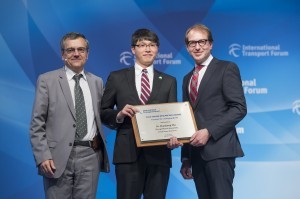
George Mason University civil engineering professor Shanjiang Zhu has been honored for his work in reducing city traffic congestion. Zhu, a Center for Transportation Public-Private Partnership Policy research fellow at School of Policy, Government, and International Affairs, was awarded the 2014 Young Researcher of the Year Award by the International Transport Forum (ITF).
Zhu was selected by an international jury of experts for his development of a multidimensional traffic congestion simulation model. His research has created an invaluable and technically sound tool to evaluate policy options for congestion reduction in cities. The award highlights the importance of transportation research for policy formulation. Researchers considered for the award are under 35 and are affiliated with a research institution in one of the 54 member countries of the ITF.
“Dr. Zhu’s work demonstrates how multidisciplinary effective transportation research has become,” says Deborah Goodings, chair of the Dewberry Department of Civil, Environmental, and Infrastructure Engineering at Mason. “Technically rigorous transportation modeling is not enough. By integrating economics and traveler behavior into numerical simulations, the result is a decision-making support tool that can have real impact on transportation planning.”
Zhu, she says, “has positioned himself as an emerging leader in practice-ready research that can be used to address the increasingly overwhelming problems of traffic congestion in large cities, including Washington, D.C., and the megacities of the world.”
Zhu developed a new multidimensional analytical framework for comparing travel demand management policies and then applied the model to the city of Beijing. His winning entry is titled “Rationing and Pricing Strategies for Congestion Mitigation: Behavioral Theory, Econometric Model, and Application in Beijing.”
“The research reveals the importance of considering short- and long-term behavior reactions to travel demand management policies,” says Zhu of his winning work. “Some reactions would compromise the effectiveness of those policies, or even make them counterproductive. Policies like ‘vehicle lottery’ or ‘one day without a car’ do bring benefits under certain circumstances. Their effectiveness depends on the level of congestion and characteristics of travelers and must be analyzed using locally collected data before any policy implementation.”
Zhu also serves as a Virginia Department of Transportation technical appointee on the Northern Virginia Transportation Authority; Zhu’s affiliated status as a research fellow “enables him to add technical depth to ongoing transportation policy research collaboration,” says Goodings.
“Professor Zhu is one of the brightest young stars we have here at Mason,” says Jonathan Gifford, director of Mason’s P3 Policy Center. “It’s a pleasure to see his talent receiving this international recognition. He has been a great contributor to the Center for Transportation Public-Private Partnership Policy. His research helps us understand how transportation users will respond to changing prices and congestion on urban highway and transit networks.”
The ITF is an intergovernmental organization for the transportation industry with 54 member countries, serving as a think-tank for transportation policy around the world. Its mission is to help shape the transportation policy agenda on a global level and ensure that it contributes to economic growth, environmental protection, social inclusion and the preservation of human life and well-being.
Write to Buzz McClain at [email protected]
